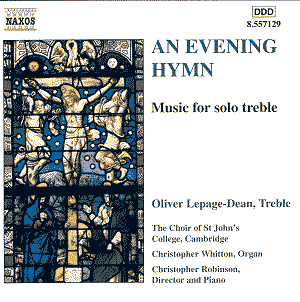Three things to say straight away about this
CD. Benefits first and concerns to follow. There is absolutely
no way that I can fault the exquisite singing of Oliver Lepage-Dean
in all these hymns, songs and numbers. Secondly the repertoire
is excellent. A varied selection of pieces by French and English
composers (plus that honorary Englishman Felix Mendelssohn!) It
covers a wide chronological range. From Pelham Humfrey to Peter
Hurford (PH and PH!). It explores corners of the repertoire which
most other labels would leave untouched. More about individual
pieces later.
And thirdly, the down side, it is not a recording
to listen to at one sitting. The purity and superb diction of
the soloist tends to pall. Unbelievably there is a tendency for
five centuries of miniature masterpieces to start to merge into
one long chant. This music ought to be approached as we eat an
elephant - one piece at a time. I know that it means jumping up
and down to the CD player or a lot of pressing of the 'remote'
but I promise you it is worth it. It is only fair to the solo
treble that we give our undivided attention to his musicality.
This being said, however, the producer has done
a great job in balancing solo pieces, those with choral accompaniment
and the use of piano and organ.
Naxos has provided a complete set of texts. This
is useful because not all the works are based on 'well known'
ecclesiastical settings. We have verses by George Herbert, John
Clare, Robert Herrick, Hilaire Belloc and Ira Gershwin.
Perhaps the easiest way to review twenty-five
songs is for me to offer my highlights. Highlights can be for
different reasons. For example, it can be the delicious Magnificat
in G by Stanford, with its filigree organ accompaniment. Or
it can be a setting by the forgotten composer W. Denis Browne.
Here is one of the tragedies of the Great War. He was killed on
active service in Turkey. I have only heard four works from his
pen. These are songs on the fine Hyperion recital, War's Embers.
The present number exhibits considerable promise and tantalises
us.
Of course the 'gem' on this CD is George Gershwin's
arrangement of his brotherís lyrics - Love walked in. Quite
obviously this is and deserves to be an encore piece!
The most famous or is it notorious Pie Jesu
is from Andrew Lloyd Webber's Requiem and sung by Sarah
Brightman and Paul Miles-Kingston. On this CD we have what is
definitely a more profound example of this liturgical text - that
of Maurice Duruflé. Perhaps his Requiem is one of
the most reflective and moving choral works to come from the pen
of a Frenchman in the 20th Century. I only regret that
this 'perfect' composer wrote such a small catalogue of works.
Yet everything he did compose is 'just right' in every detail.
Perhaps it was not a good idea to put Lili Boulanger's
Pie Jesus next to Duruflé's? Yet it bears little
resemblance to him. Gorgeous in its own way, it does not move
me in the same way as Duruflé's does.
I love the Richard Rodney Bennett. He has chosen
to set ornithological words by Clare, Tennyson, Shelley and Coleridge.
Bennett is well known for his ability to compose in a variety
of styles - from jazz to film music. However, these songs are
fairly and squarely in the tradition of English Lieder. They deserve
to be well known and perhaps taken up by one of the senior proponents
of this genre.
Most pianists have hacked through John Ireland's
Holy Boy (1938) . However it is nice to hear this 'tune'
being used to the words of Herbert S. Brown. However do not forget
the piano piece came some 23 years previously!
Bax's Christmas Carol - There is no Rose
- may not count as one of his greatest works. Yet it has its place
in the canon and has all the characteristics of the 'English'
school. The form of this piece is almost symphonic - being constructed
in an 'arch' with a great climax and quiet beginning and ending.
However I am more moved by Howells' setting of these words.
Benjamin Britten, that great champion of music
for children, is well represented here by three settings of folk
songs. They are well sung and have all the 'sophistication within
simplicity' that characterise so many English folksongs.
There are pleasant works by Lallouette, Humfrey
and Purcell that would grace wherever 'choirs and places sing.'
Felix Mendelssohn's contribution is especially
beautiful. However my German is not sufficient to be able to translate
either the title of the text. Naxos does not help here. It has
a fine choral accompaniment too. Perfect! How glad I am that they
steered clear of those Dove's Wings!
Carols by Peter Warlock, a Litany by
Peter Hurford and an excerpt from Five Mystical Songs by
Vaughan Williams complete this varied and well-thought out programme.
Hurford is influenced by Bach in his organ works in general and
this choral setting in particular. The Warlock settings are accompanied
by the piano and form an attractive trio of songs. The most famous
of course is Balulalow - a lullaby set to words penned
by Martin Luther. The Call is perhaps the emotional heart
of the Five Mystical Songs. These words by George Herbert
never fail to move me when I hear them.
As usual with Naxos it is impossible to fault
the sound quality and the presentation. The quality of performance
is excellent and the repertoire well chosen. A first-rate CD for
those who enjoy this particular vocal style.
I must confess that I am not an enthusiast of
'solo treble' - being perhaps put off by remembrance of hits by
Aled Jones. However in small doses it is inspiring, attractive
and enjoyable. A really nice CD.
John France


